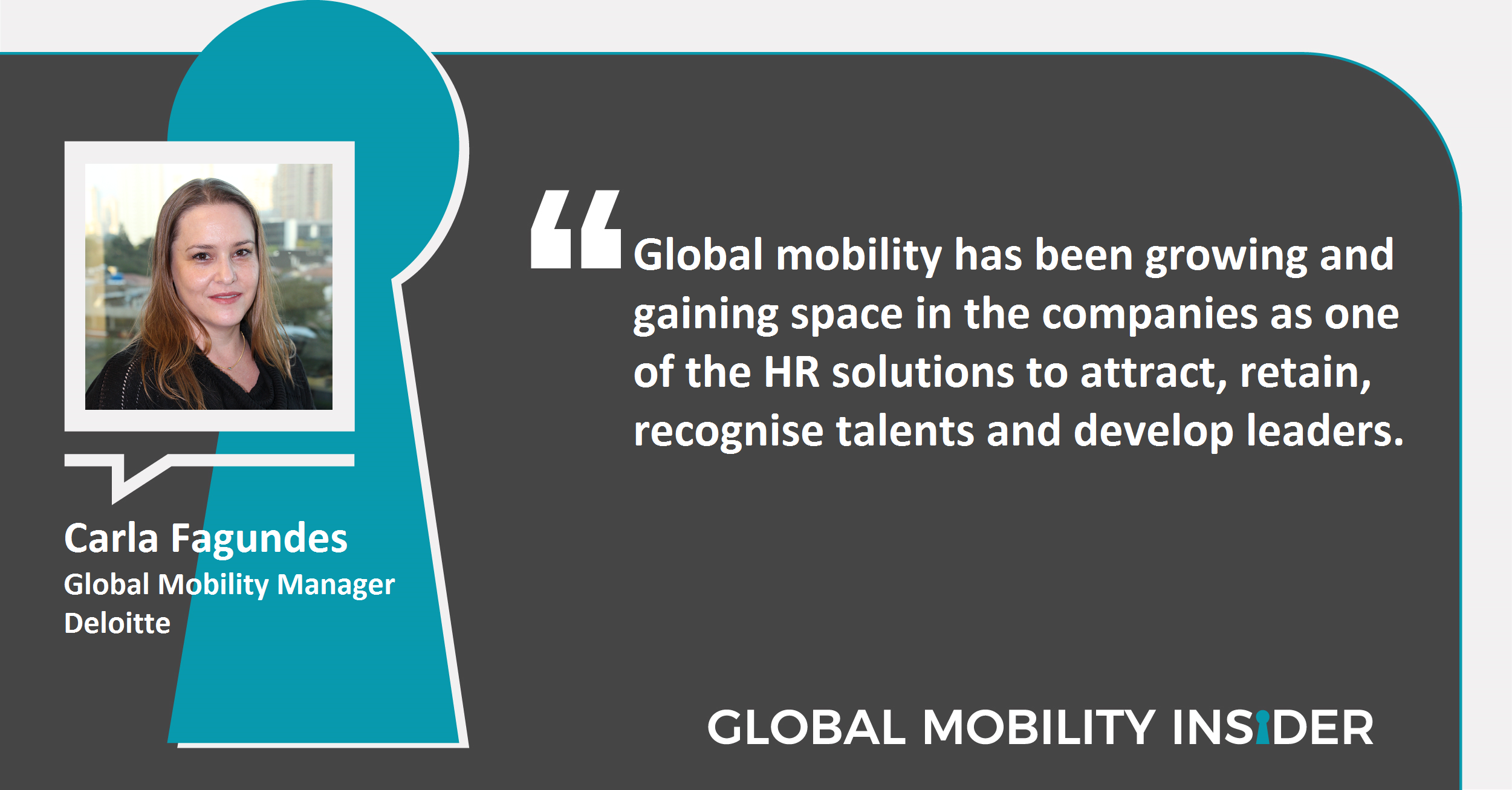Carla Fagundes - Global Mobility Manager - Deloitte (Brazil)
Name: Carla Fagundes
Job: Global Mobility Coordinator
Company: Deloitte (Brazil)

Professional Background
EY, Senior Talent Acquisition Specialist: 2010-2011
Deloitte, Global Mobility Coordinator: 2012-Present
Career Insider
Q: So, why global mobility and how did you get started?
A: Mobility is an exciting, complex area in which we can learn and overcome challenges every day, as each expatriation is a unique business case involving specific immigration and tax rules, deadlines, the alignment of a series of details, and a professional with many careers and personal goals to achieve.
Also, Mobility has had an increasingly important role in meeting the organisations’ and their talents’ needs. Companies need to have talented people ready for cross-border businesses and the hierarchical succession. Whereas, talents pursue consistent and challenging international experiences. It is a very interesting blend to be part of.
I started in 2012, when I assumed Deloitte Brazil´s GM operation, after serving in the Talent Acquisition and HR Projects areas. Originally, my goals only consisted of aligning the global and local policies and optimising processes as part of a project being conducted by the HR department. But, besides gaining a passion for the area, Deloitte Brazil’s mobility requirements increased so much that I ended up embracing this career, and I had much pleasure in doing so. Today, I can confidently say that our work in Brazil is very much in line with the best global practices, and our participation in inbound and outbound programs, as well as our success rates, have grown annually.
I work exclusively in corporate expatriation processes for Deloitte´s professionals. I do not provide services to external clients.
Click & Like on LinkedIn
Q: What is 'business as usual' like for your company?
A: As a professional services firm serving global clients, Deloitte offers its professionals international opportunities aligned with the requirements of its businesses, which always need people capable of overcoming cultural and language barriers.
Besides, it is imperative for us to have our client-service team globally standardised in terms of technical, specific and leadership capabilities. Mobility is one of the best ways to leverage this process.
Thus, our ‘Business as Usual’ (BAU) is a dynamic move of professionals both in cross-border projects, at clients, and short- and long-term programs that offer international job positions.
Q: What advice would you give to someone looking to build a career in global mobility?
A: Be a Mobility Advisor always. Today, GM is no longer only a compliance area that facilitates visas and travels and calculates salaries and taxes. Besides having a thorough knowledge of these processes and all variables involved in an expatriation, a Mobility Advisor should know the company’s needs, map the potential audience and assist the stakeholders in sending and receiving the right people to the right place at the right time.
Industry Insider
Q: How do you think the global mobility Industry has changed over the years?
A: In my view, global mobility has been growing and gaining space in the companies as one of the HR solutions to attract, retain, recognise talents and develop leaders. It is an evolving process, maybe medium/long term, but it has certainly begun.
Our partners have kept track of this development and have provided increasingly customised packs of services.
The industry’s development has been much stronger in other countries than in Brazil, but I think Brazil tends to follow this trend, not only because of business need but also because of the profile of the new generation and the government´s position, which has recently revised its migration policy.
Q: Do you think global mobility is a good investment for companies?
A: Providing our professionals with enriching international experiences is offering them the opportunity to gain a broader and more integrated view of the Firm´s businesses, expand their network and know the best practices in the global market. This ultimately means having them prepared to offer high standard deliveries to our clients.
The financial investment involved in an international move has always been an issue. However, today, at Deloitte, the most successful program is also the one with the lowest cost. Our professionals, by themselves, look for open positions in other Member Firms, apply for the position for a long-term assignment and assume living temporarily as a local in the host country. This program not only meets our professionals' interest in having consistent international personal and professional experiences but also increases retention and triggers a talent feedback process within the global structure.
Considering this, the return on the investment is not long-term after the professional returns to their home country. Actually, the return is immediate, since the interaction and sharing of best practices among us and our offices abroad are made possible through this interchange.
Q: What is the most important strategic tip you can give to people handling global mobility?
A: Ensure the alignment of a plan of goals for the assignment and, also, for the repatriation. Assignees should clearly know what the company expects from them, how their goals will be achieved and what post-assignment challenges they will face. Managing costs and having KPIs aligned with the business is also critical. My internal clients are very demanding when it comes to these requirements.
Visionary Insider
Q: What global hiring trends do you see developing in the next five years?
A: Despite the protectionist policies of some countries, I believe many companies tend to continue to expand their field of search for talents to beyond geographical boundaries and, therefore, having a GM team well-prepared to meet this requirement will make all the difference.
Q: What more can be done to improve current global mobility practices to benefit talents on the move?
A: Moving overseas may imply learning a new language, settling children in a school abroad, which means that they need to leave their friends and grandparents, making spouses to interrupt their careers, getting exposed to risks, getting adapted to low temperatures and different kinds of foods. On top of that, there are concerns about meeting the company’s expectations and achieving goals relating to high-level professional deliveries.
Not everybody considers this before accepting this challenge and, many times, we need to help the professional to get aware of the consequences of their decision for their family life, help them to understand that the responsibility for the success of the expatriation is not solely the company’s and, mostly, design an action plan to mitigate all these.
I think a simple, effective manner to start addressing this is offering an intercultural advisory and international security assistance services, both 24/7, provided by professionals specialising in these areas.
Either/or…
- Short-term assignment or Long-term assignment? Short-term assignments are more challenging
- Airbnb or Serviced Apartments? Depends on the case.
- Excel or Global Mobility Software? Both are useful.
- Lump Sum or Flex Ben? Flex Ben
- Facebook or LinkedIn? Both
- Outlook or Gmail? Outlook
- Taxi or Uber? Black Taxi
- iOS or Android? iOS
- Mac or PC? Both
- Computer or tablet? Both
- Work hard or play hard? Both as well!


Leave a Comment
* Fields marked with this asterisk are mandatory.